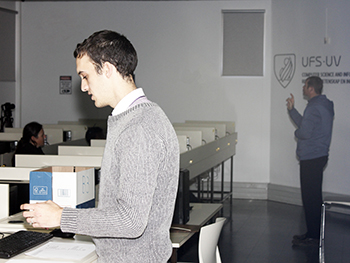Latest News Archive
Please select Category, Year, and then Month to display items
08 April 2021
|
Story Thabo Kessah
|
Photo UFS Photo Archive
 Dr KPD Maphalla with former UFS Chancellor, Dr Franklin Sonn, during the graduations in April 2007.
Dr KPD Maphalla with former UFS Chancellor, Dr Franklin Sonn, during the graduations in April 2007.
The University of the Free State is sad to learn of the passing of alumnus and award-winning Sesotho literary giant, Dr KPD Maphalla.
The literary works of Dr Khotso Pieter David Maphalla, like many other African writers and artists, were influenced and characterised by his own era of powerful forms of oppression and exclusion from dominant literary discourses. In his own right and through his writings of poetry, novels, short stories, and kodiamalla (dirge), he articulated a deliberate political and social protest and pushed for a place for African languages in literature at the height of apartheid.
“He entered the professional scene with his ground-breaking novel, Kabelwamanong, in 1982 at the age of 27. His career actually started in 1971 while he was still at school. Since his first novel, he has produced at least two books annually, covering the genres of poetry, novels, dramas, and short stories. As a dramatist, Dr Maphalla has written a number of excellent and educative radio dramas for the then Radio Sesotho (now Lesedi FM),” said his long-time friend and Head: African Languages at the University of the Free State, Dr Nyefolo Malete.
“It was for this writing prowess that he received recognition from the UFS when he was awarded an Honorary Doctorate in Literature by the Department of African Languages during a momentous ceremony on the Qwaqwa Campus in 2007,” added Dr Malete.
Dr Malete also revealed that, despite losing the use of his right hand after suffering a stroke following a car accident in the late 1990s, Dr Maphalla continued writing using his left hand. “He was adamant that, what he referred to as his ‘supposed disability’, would not deter his passion for writing.”
Dr Maphalla’s work has also produced numerous scholarly studies by the likes of Profs Moleleki Moleleki (protest poetry), Thapelo Selepe (lament and protest poetry), and Dr Seema Seema (process of cross-cultural communication). He was a committed Qwaqwa community member, who was also instrumental in the founding of Qwaqwa Community Radio (2000) and Metjodi Writers (2006), among others. He has written more than 70 books, many of which have been prescribed texts in schools.
Some of the awards he has won include:
South African Centre for Digital Language Resource (SADiLar) Sesotho Lexicographic Unit (Sesiu sa Sesotho) Lifetime Award for outstanding literary works and for promoting Sesotho literature (2019).
The Literature Festival and the University of the Free State Award for enormous contribution to Sesotho literature by a South African writer (2019).
Lifetime Achiever Award in Literature awarded by the Department of Arts and Culture (2005).
M-Net Book Prize for Sesotho poetry (2005). The first and thus far the only Sesotho author to have received this honour.
M-Net Book Prize for best novel (1996).
De Jager-HAUM Literary Award for his volume of short stories, Mohlomong Hosane (1993).
Thomas Mofolo Trophy for Best Novel, Best Poetry, and the Overall Award (1992).
Thomas Mofolo Trophy for Best Poetry (1991).
Dr JJ Moiloa Floating Trophy for Best Sesotho Poetry Book of the Year, Kgapa tsa ka (1985).
South Campus supplementary schools foster future Kovsies
2016-07-13
The Monyetla Bursary Project, in partnership with the University of the Free State (UFS) and other sponsors, presents an annual Winter School for Grade 12s on the South Campus. In addition, a Saturday school for Grade 12s has been in operation since 2007.
“Champion teachers
in the district
assist learners”
Chris Grobler, a science teacher at Navalsig High School in Bloemfontein, is the organiser of both schools. He says, “I saw it as a tragic state of affairs that those offering bursaries and the bright learners from our formerly disadvantaged schools were not meeting up with each other.”
The first year saw 300 learners attending, with five subjects being presented. This tally has since grown to 650 learners each Saturday, with 11 subjects being presented, including Business Studies, Computer Applications Technology (CAT), Geography, Maths, and English.
“Our vision was to get champion teachers in the district to assist learners to qualify for university bursaries,” says Grobler. The project has succeeded in attracting educators with extensive experience as chief markers or even subject advisors in the Department of Education.

Roald Rautenbach presents the Computer Applications
Technology (CAT) class while Peet Jacobs interprets in SASL.
Video recordings are also made for later distribution.
Photo: Eugene Seegers
Wider reach
“This year, the 1 200 learners at the Winter School hail not only from the Free State but also from as far as North-West, Gauteng, and the Eastern Cape.” Grobler says, “We are very pleased about this, as it means that the image of the UFS is being carried further afield.”
Lesego Modisele, one of the visiting learners from Parys, says, “I like how they brought in teachers that are heads of their subjects, who are very experienced and help us a lot. They explain how exam papers are set and which important things to focus on.”
By means of the Schools Partnership Programme (SPP), 250 learners from Thaba Nchu and Botshabelo have also been assisted. Katleho Setloho, who was one of these students, is currently a medical student at the UFS.
A special feature included in this year’s programme is interpreting services in South African Sign Language (SASL) for Deaf students. As an added bonus, a disc of the sessions in SASL is being compiled for English, Mathematics, and CAT, with plans for it to be distributed to the deaf community in the rest of South Africa via the UFS.